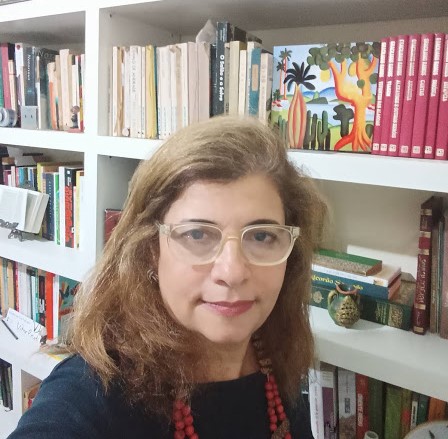São Paulo – A doctor in History and Literary Theory from the University of Campinas (Unicamp), Muna Omran is the daughter of a Syrian father and a Lebanese mother. Born in Rio de Janeiro, Brazil, she co-founded the Group of Studies and Research on the Middle East (GEPOM) and has pursued a long academic path, focusing on breaking stereotypes on the Middle East, Arab countries, Islam, and Arab and Muslim women. Omran gave a phone interview to ANBA on Wednesday (24).
Researching and spreading the Arab culture has always been a priority for Omran. She graduated in Portuguese and English and learned to read and write in Arabic. “My grandfather lived almost 70 years in Brazil and only spoke Arabic. We read the Quran in Arabic. This was the basis of my education,” she reminisced. At the time of September 11, 2001, Omran saw the need to show and stand up for her culture as an Arab Muslim woman.
She told she used to spend holidays in Lebanon and watches online Arab newscasts from several countries in the region. She’s an enthusiast of Arab movies, soap operas, and books, too. “There’s an Arab saying, ‘everyone goes back to their roots,” she said. Omran believes the cuisine is a link between cultures, but stresses the Arab culture goes way beyond sfihas and kibbehs.
Omran follows her family’s religion, the Islamism but doesn’t use a hijab, a veil on her head. “Nobody uses it in my family, neither here nor in Lebanon, except for older women. That’s common in Lebanon. Not using a hijab doesn’t make me less Muslim, it doesn’t take me the right to speak about Islam,” she said.
The scholar loves books by Milton Hatoum and Raduan Nassar, who, she says, changed how the diaspora was represented in Brazilian literature. “They are children of the diaspora and, from the 80s on, you see this change, as the Arabs had usually been misrepresented before, even in works by Machado de Assis. Tale Of A Certain Orient by Milton Hatoum is a masterpiece on immigration, an unparalleled aesthetics. I really admire his work,” she said.
Enthusiasts of the Middle East
The GEPOM group was created last April by Omran, professor Monique Sochaczewski and economist Najad Khouri. “It was our way of working at the moment were everyone was going mad at home [due to the pandemic and social distancing,” she says.
One month after it was created, some online courses were implemented. “We noticed a non-academic audience that was eager for this knowledge, so we left the university premises to go online. Our students include businesspeople, military reserves, researchers, diplomats, professors, and socialites,” she said.
Omran says the lay audience struggles to understand the Middle East. “We started by meeting this demand for clarification. In Brazil, there’s a very negative stereotype on Arab culture, particularly on Islam issues. We aim at breaking this stereotype,” she said.
Another feature of GEPOM, she says, is bringing current topics on the Middle East, including politics, history, entertaining and culture. “All courses, even those involving historical issues, bring current issues to be reflected upon,” she said. The courses offer quotas for an inclusive education.
The Beirut Port blast last August made Omran see a demand from students about what’s going on in Lebanon. “Then we did a live streaming, which was packed with people, then we started doing a regular free live streaming,” she said.
Find out more about GEPOM’s courses:
Omran currently teaches Language Studies graduate courses at the Fluminense Federal University (UFF). Her most recent research focuses on gender studies and women in the Arab world in history, cinema and literature. “My current research is on gender. The Arab women are not that different from the Western women in their demands and freedoms,” she said.
In addition to her academic work, Omran adds she’s a screenwriter and playwright. “I grew up watching Arab movies and listening to Arab songs. The immigrant craves for their culture, and in my family’s case this occurred through the arts,’ she said, mentioning songs from great Arab singers such as Lebanon’s Fairuz and Egypt’s Umm Kulthum.
Translated by Guilherme Miranda




